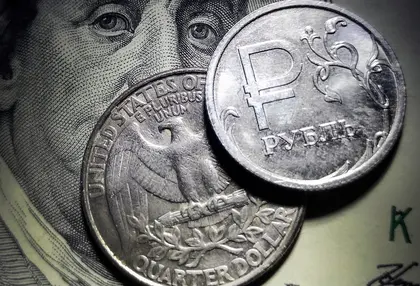Russia’s economy is not well, leading some economists to predict that the Kremlin will stop trying to defend the ruble’s value, to keep it below 100 to the US dollar, now that the Russian presidential elections have passed.
Volodymyr Lugovskyy, an economist at Indiana University, told Kyiv Post that he is “not alone” in predicting the “ruble to fall badly within a month,” explaining that it “should have happened a long time ago, but the ruble was kept at 100 at a great cost to the Russian economy for political reasons.”
JOIN US ON TELEGRAM
Follow our coverage of the war on the @Kyivpost_official.
Lugovskyy said that there have been two major, recent blows to Moscows economy: up to 12 percent of Russia’s oil refineries have been damaged by Ukrainian drone strikes and that the threat of “US sanctions has made India, the major current importer of Russian seaborne oil to reconsider importing it,” noting that these “events are serious blows to Russian oil industry and domestic economy.”
The situation has gotten so bad in Russia that one of the leading oil-producing nations has been struggling with ongoing shortages of gasoline, prompting it to institute a six month ban on the export of gasoline.
The US-based economist said this reflects the reality that “sanctions work,” adding: “They cripple Russia’s ability to produce or import things domestically to a great extent; especially technologically advanced products. Aircraft is a key example. In 2022, Russia made big declarations of substituting Western airliners with domestically produced planes, for which they got the government funding... but it went nowhere. Meanwhile, the keep flying Western aircraft at an increasing risk as they are not maintained properly, as spare parts are often not available.”

Putin Says Inflation ‘Worrying’ But Russian Economy ‘Stable’
Lugovskyy said that though “Russia still has gold with which it can buy critical imports,” it remains the case that “a decrease in oil exports and domestic consumption is a serious blow to Russian economy as it critically depends on these revenues.”
The “Russian economy cannot survive without critical imports,” Lugovskyy said, while Moscow attempts to get the critical goods it needs in two ways: directly from China or by smuggling EU or US products through friendly neighboring countries.
He concluded that, at this stage, “many spheres of Russian economy are in decline and the state of Russian economy may further worsen if US and EU keep applying targeted sanctions against critical imports.”
You can also highlight the text and press Ctrl + Enter






